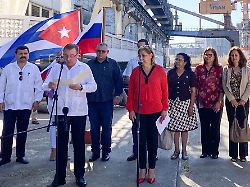Rosneft boss in Cuba
Russia is demonstrating its power on America’s doorstep
By Andrea Sellmann and Mary Abdelaziz-Ditzow
3/9/2023 3:49 p.m
Only 160 kilometers separate Cuba from the USA. Politically, however, there are worlds between the two countries. While US sanctions have been weakening the Caribbean state economically for decades, Russia is reaffirming its friendship – and raising hopes for new energy reserves in Cuba.
Cuba is in a serious crisis: the US embargo has been weakening the economy of the Caribbean island for more than six decades. Most companies are nationalized and work inefficiently. In the corona pandemic, tourism as the most important source of foreign exchange also failed. The result was violent unrest. Even if the situation has calmed down a bit in the meantime: groceries, medicines and petrol remain scarce goods. In the midst of the fuel shortage, a Russian oil multinational has now visited the country.
The Cuban President, Miguel Díaz-Canel Bermúdez, tweeted it himself: A few days ago, Igor Sechin, CEO of the Russian oil company Rosneft, was a guest at the Palace of the Revolution. According to the report, the talks also included the energy sector. While details are not known, what is certain is that Russia has plenty of energy reserves, while Cuba is experiencing a fuel shortage due to US sanctions.
Cuba is one of the countries that abstained in both UN votes on the Ukraine war. The Russians, ostracized by the West since the attack on Ukraine, appear to want to strengthen relations with the Caribbean country – including with deliveries of wheat, which the Reuters news agency reports.
“Cuba is a reflection of 20th century history”
It is not surprising that Russia is now getting closer. After all, Cuba is the land of the communist revolution: Fidel Castro and Ernesto “Che” Guevara took over there in 1959. Her pictures are still omnipresent today. Marcel Kunzmann knows this from his student days in Havana: “Cuba is a reflection of the history of the 20th century,” he explains in the podcast “Wirtschaft Welt & Weit”. US classic cars are silent witnesses to a long-gone friendship with the USA. Soviet buildings mix with relics of colonial history and make geopolitics visible even for tour groups.
Kunzmann, who has been researching Cuba for years, explains that Cuba once saw itself as part of both the non-aligned states and the Soviet camp. For him, Cuba maneuvers in the geopolitical field of tension between the USA, China and Russia and is always in relation to the superpowers.
During the Cold War, Cuba’s position was clear: Soviet missiles were stationed on the island, aimed at the US. Only 160 kilometers as the crow flies separate the two countries. During the Cuban Missile Crisis in October 1962, the world came frighteningly close to nuclear war. When Putin speaks of nuclear strikes today in the course of his attack on Ukraine, many people remember those times.
According to a Cuban news report, the atmosphere during the Rosneft boss’s visit to Havana was friendly: Sechin is said to have brought greetings from the Russian President and the information that Putin personally and personally monitors all issues and issues related to cooperation between Russia and Cuba. The USA, that much seems certain, will keep a very close eye on this cooperation.
What does Germany have to do in order to still play an important role in the economic world of tomorrow? Who are we dependent on? Which countries benefit from the new world situation? Mary Abdelaziz-Ditzow discusses this in the ntv podcast “Wirtschaft Welt & Weit” with relevant experts.
You can find all episodes in the ntv app or wherever there are podcasts: at RTL+ music, Apple Podcasts, Google Podcasts, Spotify, Amazon Music or deezer. For all other podcast apps, you can use the RSS feed.
